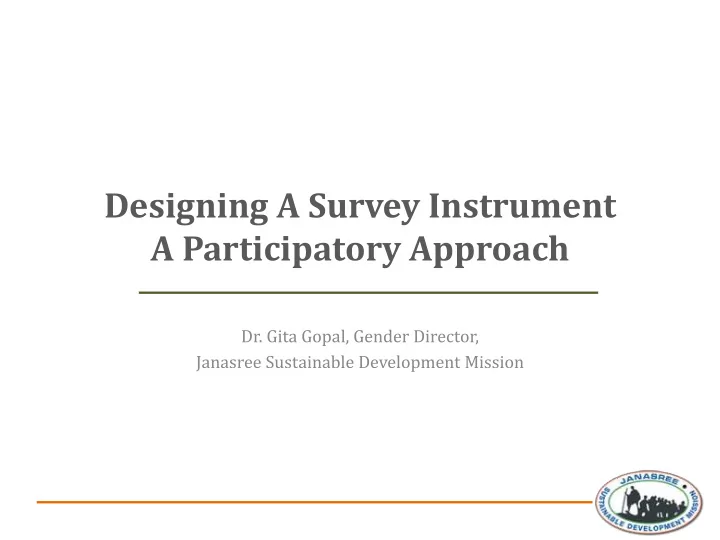

Designing A Survey Instrument A Participatory Approach Dr. Gita Gopal, Gender Director, Janasree Sustainable Development Mission
Objective of Presentation Introduction, Background, and Objectives… Why Participatory Approaches? Planning Stages… Developing the Survey Instrument… Risks and Challenges… So What Happened?
Janasree – A Grassroots Organization An NGO with 65,000+ registered Self-Help Groups (SHGs) of men and women in all of Kerala… Broad Objectives - Sustainable and Eco-Friendly Development Each SHG sets objectives within the broad agency mandate Common activities – group savings and loans to members Janasree links SHGs with the Private and Public Sectors
Gender Equality in Kerala Social High Levels of Human Development but Deteriorating Social Development Economic Differential Access to Economic Resources and Opportunities Political Weak Voice and Participation Government and Dialogue in a Women and Development Approach
Results of Janasree Activities Anecdotal Information Available Need for Assessing Results for Better Programs and Resource Allocation Celebrate the Positive Progress Enhance Accountability for the Self-Help Groups Little Knowledge of the Gender-related Impact
Objectives Design and Pilot A Gender-Aware Monitoring System at the Grassroots Level Formally Introduce a “Gender Equality” Approach Influence Policy Makers in Kerala to Shift Towards Gender Equality and Gender Mainstreaming
Why a Participatory Approach? Improved Development Effectiveness Learning at the Grassroots-level Leading to Better Development Effectiveness Increased Accountability at the SHG Levels Strengthened Capacity Comparative Advantages Effective Grassroots Structures for Participatory Action Commitment from Top Management to a Participatory Process Availability of Human Resource
Why A Pilot? Validity and Credibility of Method for Stakeholders Relevance of Information Being Generated Sensitivity of Data being collected (picking up data variations sufficiently and be adapted) Cost-effectiveness: Is the information being produced worth the cost? What are the tradeoffs? Timely: In a Manner Helpful for Management Is the Approach Achieving the Desired Objectives?
Plan, Plan, and Plan Participatory Process Enhancing Learning (Process) Organizing Evidence the Based Workshop Selection of Adapting Participants Knowledge Selection of Applying Facilitators/ Learning Trainers Generating Selection of New Partners Learning
Process of Piloting …. (Phase 1) Pre-Pilot Monitoring System with Baseline established Workshops to Discuss Feedback Participants Test Instruments with a • Sangham larger group Members Development of • Policy Pilot Draft Survey Workers Instrument 5 day Workshop to Train Surveyors 2-day Planning Workshops Anecdotal Information
Which Results to Monitor… Agency’s Theory of Gender Mandate Change What is gender Results Inputs to Equality? Framework Outcomes
Turning Outcomes to Indicators Iterative & Interactive Group Identifies a Development Issue and an Associated Intervention Determines how the intervention will achieve results by converting a series of inputs into a defined set of outputs that are expected to achieve a desired development result or outcome, Discusses inputs, outputs, and outcomes discussed (Gender Implications) Identifies indicators – 2 for each level (input, output, and outcome)
Understanding Methodologies Strengthened Capacity for Conducting Focus Group Discussions Simulations on 3 different subjects (Road Safety, Gender Violence, Alcoholism) Field Testing During Workshop Testing with Larger Set of Groups Discussion of Experience and Feedback
Developing the Instrument Based on desired results, a draft survey instrument was prepared Social Economic Progress in Development Progress Background Views on (Alcohol, Gender (Income, violence, Dowry, Information Gender Savings, and Training and Equality Borrowing) Skills Acquisition )
Developing Data Collection Instrument Instrument Process Frequency of Collection Clarity and Simplicity Clear Responsibility Identifying Relevant Dimensions and Indicators Costs of Collection Formulating the Questions Quality Control
Moving Forward to Full State-Wide Pilot Pilot (Phase I) in 25 groups in TVM district Data entry is currently on going for establishment of baseline Is coding answers too difficult for such grassroots situations? Too many questions? A little more risk taking vs. ownership? Two more workshops before expanding to 750 groups each 28 of those previously trained appointed as “Social Monitors” – capacity will be strengthened and will monitor Phase II Establish baseline covering 750 groups A Continuous Process of Capacity Building
Participation is Tedious Reluctance Participatory Process Is this the tax agency Takes Time Convincing Second-Level or a foreign agency with vested interests? Management Selection of SHGs Provide Space to Achieving Gender Express Uncomfortable Balance Views Ethical Dilemma Relevant Examples
Risks and Challenges Stiff Resistance to Change Critical Need for Ownership Keeping the Instruments Simple… Integrity of Pilot/ Data Collection and Entry Trade Offs between Rigor and Participation Appropriate Partners …
Monitoring Efforts Pre-tests and after tests Evaluation One Form Pre-determined Indicators
Results? Strengthened Capacity Some Data for Management on Groups A Gender Action Plan – focus on alcoholism and gender violence Increased and Improved Partnerships Shifting to a Gender Equality Approach in Policy Changing Mindsets (!)
Who are Janasree Leaders? Female Male 102 99 96 39 36 33 Chairman Secretary Treasurer
Is Alcohol A Problem in Your Household? (1841 Respondents) Modest to High Problem No Problem 23% 52% Low Problem 25% Yet Very Few Go For Counseling!
Gita Gopal, Gender Director Janasree Sustainable Development Mission Jagathy, Trivandrum http://www.janasreegendermission.org/janasree.html Gitagopal@hotmail.com
Recommend
More recommend